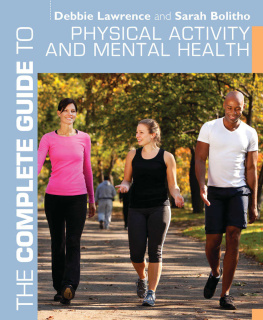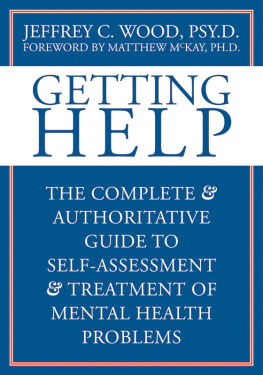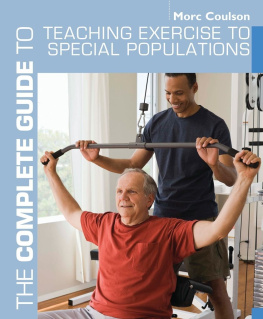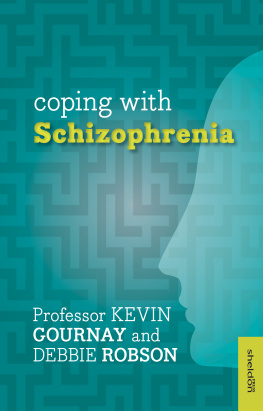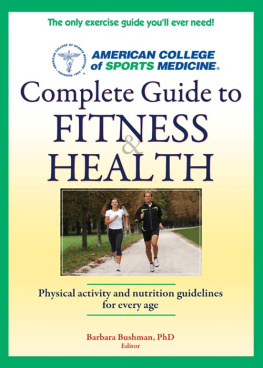(Consultant) Debbie Lawrence - The complete guide to physical activity and mental health
Here you can read online (Consultant) Debbie Lawrence - The complete guide to physical activity and mental health full text of the book (entire story) in english for free. Download pdf and epub, get meaning, cover and reviews about this ebook. year: 2015, genre: Home and family. Description of the work, (preface) as well as reviews are available. Best literature library LitArk.com created for fans of good reading and offers a wide selection of genres:
Romance novel
Science fiction
Adventure
Detective
Science
History
Home and family
Prose
Art
Politics
Computer
Non-fiction
Religion
Business
Children
Humor
Choose a favorite category and find really read worthwhile books. Enjoy immersion in the world of imagination, feel the emotions of the characters or learn something new for yourself, make an fascinating discovery.
- Book:The complete guide to physical activity and mental health
- Author:
- Genre:
- Year:2015
- Rating:3 / 5
- Favourites:Add to favourites
- Your mark:
- 60
- 1
- 2
- 3
- 4
- 5
The complete guide to physical activity and mental health: summary, description and annotation
We offer to read an annotation, description, summary or preface (depends on what the author of the book "The complete guide to physical activity and mental health" wrote himself). If you haven't found the necessary information about the book — write in the comments, we will try to find it.
The complete guide to physical activity and mental health — read online for free the complete book (whole text) full work
Below is the text of the book, divided by pages. System saving the place of the last page read, allows you to conveniently read the book "The complete guide to physical activity and mental health" online for free, without having to search again every time where you left off. Put a bookmark, and you can go to the page where you finished reading at any time.
Font size:
Interval:
Bookmark:

As a physiotherapist working in the Mental Health sector for more than 10 years I have seen the increasing importance of exercise for these patients in counteracting the poor lifestyle, higher morbidity rates from cardio-respiratory problems and diabetes and other side effects from medication that affects weight management and physical abilities. Stigma, prejudice and a lack of understanding impacts upon the ability of patients (or service users) to access services that may help them and they often require additional support to make the necessary changes.
Within health there are limited opportunities to participate in exercise and can be compromised due to the acuity of their illness. There is now an increasing focus on the recovery model and supporting service users in the community, and it is important that all exercise providers are able to provide suitable support to help patients to achieve their general health goals as part of their recovery and a healthy lifestyle. It will be essential to work collaboratively with healthcare providers that have an overlapping role with other providers to make the best use of all appropriate resources. This will include joint training of dedicated staff and identifying the smooth transfer of patients from hospital care to community focused care, dovetailing resources to ensure optimal recovery for the individual.
In the Mental Health sector, the transition between specialist exercise services for service users in secondary care provides an initial safe and supportive environment to help them get into a routine of exercising with a tailored approach, which in turn builds confidence and provides motivation. The advanced training of Level 4 practitioners gives me more confidence that the greater percentage of people with mental health problems that do not necessarily come into secondary care are supported by staff who understand in more depth how mental health affects an individual and their life. It will help reduce stigma and prejudice and aid social inclusion. It will also ensure that the principles of recovery and empowerment are incorporated into the engagement of people using exercise to regain their health and well-being.
Liz John
Head of Physiotherapy in Mental Health, Cardiff & Vale University Health Board
Member of the Chartered Society of Physiotherapy
2011
Over 300 people in every 1,000 experience mental health problems every year in Britain and of these 230 will visit a GP. From there, 102 people will be diagnosed as having a mental health problem and 24 will then be referred to a specialist psychiatric service with 6 becoming inpatients in psychiatric hospitals.
The aim of this book is to provide exercise professionals with the underpinning knowledge required to design, agree, deliver and adapt physical activity and exercise programmes for persons with mental health conditions.
The content is mapped to the National Occupational Standards at Level 4 (developed by SkillsActive 2010) and is designed to support the learning of exercise professionals who are working towards Level 4 qualification in Physical Activity for Persons with Mental Health Conditions.
The book does not provide explanations and descriptions of exercises or exercise programmes, as these are detailed in other books from the Complete Guide and Fitness Professional series published by Bloomsbury. It is expected that instructors working towards any of the level 4 qualifications would hold qualifications in a range of level 2 and 3 exercise disciplines, to enable them to work in a variety of ways to support this client group becoming more active. Rather, this book will provide an overview of a range of mental health conditions and will discuss considerations for working with persons with these conditions. It will build on models of motivation and behavioural change and communication skills and explore ways of working with clients, including roles, responsibilities and boundaries, initial assessment and information gathering and planning and delivery considerations.
Debbie Lawrence
Sarah Bolitho
2011

MENTAL HEALTH AND PHYSICAL ACTIVITY
Mental health is an aspect of our total health that is often taken for granted. We share our happy days and good moods and we celebrate our successes and joys. However it is a different story when we are feeling sad, grumpy or in emotional pain. Somehow these equally valid and important emotions are considered wrong, unpleasant and shameful. People are keen to share their happiness but all too often the less happy emotions become internalised and locked away, unwanted and untreated.
This part aims to explore the concept of mental health and mental ill-health and to examine some of the theories surrounding mental health conditions. Also discussed are the more frequently encountered conditions, possible causes and available treatments, including activity.
The benefits of activity for mental health and the recommendations for participation are discussed and also examined are the barriers that exist, both internally and externally, that hinder the adoption of and adherence to physical activity.
It is hoped that this section will inspire you to consider your own mental health and to investigate your feelings about mental illness. As fitness professionals we have a role to play not only in promoting activity among individuals with mental health problems but also in developing awareness and understanding in others.
During depression the world disappears. Language itself. One has nothing to say. Nothing. No small talk, no anecdotes. Nothing can be risked on the board of talk. Because the inner voice is so urgent in its own discourse: How shall I live? How shall I manage the future? Why should I go on?
Kate Millett (1991) The Loony Bin Trip, Virago Press Ltd, UK
Mental illness is nothing to be ashamed of, but stigma and bias shame us all.
Bill Clinton
This chapter introduces the concepts of mental health and mental illness. It outlines some definitions of mental health from varied and respected sources and introduces some of the factors that will affect our perception of what is considered normal and what is considered abnormal. With regard to mental health, this would include the beliefs, thoughts, attitudes, feelings/emotions, sensations and behaviours that are deemed as normal within our environment. These attitudes and beliefs will affect how we treat others with mental health conditions, also the regard in which we hold, and the value we place on, our own mental health.
This chapter also introduces some of the psychological models used to diagnose and treat mental health conditions. It outlines the criteria used by the medical classification system (DSM) and identifies some criticisms of this approach, setting the scene for a more integrative approach to working with clients with mental health conditions.
Ultimately, chapter 1 serves as an introduction to some of the themes and issues that will be revisited throughout the rest of the book.
OBJECTIVES
By the end of this chapter, you should be able to:
recognise some of the factors that contribute to the perception of what is normal/abnormal (thoughts, beliefs, attitudes, emotions, behaviours etc.) mental health;
Next pageFont size:
Interval:
Bookmark:
Similar books «The complete guide to physical activity and mental health»
Look at similar books to The complete guide to physical activity and mental health. We have selected literature similar in name and meaning in the hope of providing readers with more options to find new, interesting, not yet read works.
Discussion, reviews of the book The complete guide to physical activity and mental health and just readers' own opinions. Leave your comments, write what you think about the work, its meaning or the main characters. Specify what exactly you liked and what you didn't like, and why you think so.

